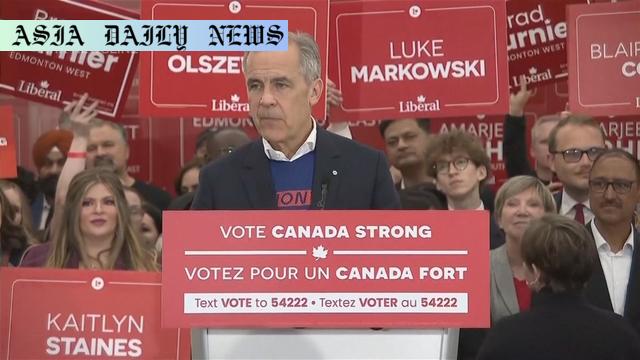Canada election: Liberal Party wins with 160+ seats, securing a lead in the House of Commons amid challenges with the US.
- Canada’s Liberal Party secures over 160 seats in the general election.
- Mark Carney rises as Prime Minister, focusing on tariff talks with the US.
- Tensions with the US fueled the campaign due to Trump’s policies and comments.
- Carney’s financial expertise and leadership strengthened public support.

Canada’s Liberal Party Secures Electoral Victory
Canada’s Liberal Party, under the leadership of Prime Minister Mark Carney, has emerged victorious in the latest general election. By securing over 160 seats out of 343 in the House of Commons, the party has reaffirmed its prominence in Canadian politics. This win not only maintains their position as the ruling party but also highlights Carney’s appeal to the electorate and his promise to restore and safeguard the country’s economy amid international challenges.
The election, described as one of Canada’s most pivotal in recent years, revolved around contentious issues such as strained US-Canada relations. President Trump’s introduction of tariffs and his overtly provocative remark suggesting Canada become the “US’ 51st state” were major points of debate. Against this backdrop, Carney’s campaign successfully portrayed him as a leader with the expertise and determination to combat economic pressure while preserving national sovereignty.
Mark Carney: The Right Leader at a Crucial Time
Mark Carney, who rose to political leadership after replacing Justin Trudeau in March, is no stranger to high-stakes decision-making. As a former governor of both the Bank of Canada and the Bank of England, Carney leveraged his extensive record in economic stewardship to resonate with voters. His decisive approach in tackling US-imposed tariffs showcased his understanding of complex international trade dynamics and national security matters.
Carney’s hardline stance against US policies appealed to a population concerned about Canada’s economic independence and sovereignty. The introduction of retaliatory tariffs further reinforced his dedication to protecting Canada’s interests. Moving forward, Canadians expect Carney to bring his financial expertise and firm resolve to the table as he engages in negotiations with US President Trump.
Conservative Party Struggles Amid Liberal Dominance
The Conservative Party, the main opposition, faced difficulties throughout the campaign. They focused their criticism on Carney’s predecessor, Justin Trudeau, citing economic mismanagement under his administration. Despite their efforts, Trudeau’s resignation and Carney’s ascent proved a turning point in reshaping the Liberal Party’s image, leaving the opposition struggling to gain traction.
For many Canadians, Carney represented a sense of renewal and progress. His credentials and firm leadership in addressing economic concerns contrasted sharply with the Conservative Party’s narrative. This decisive election marked not only a reaffirmation of the Liberal Party’s vision but also a clear rejection of the opposition’s attempts to capitalize on national discontent.
The Road Ahead for Canada-US Relations
One of the largest challenges for the new administration lies in fostering Canada-US relations. While Carney has vowed to protect Canadian interests, he also recognizes the importance of maintaining a functional economic relationship with the US, Canada’s largest trading partner. Negotiating tariff agreements and finding common ground in areas such as trade and security will require delicate diplomacy and strategic foresight.
Canada’s evolving relationship with the US under Trump’s administration has been fraught with tension. However, Carney has signaled a readiness to explore alternative trade relationships with other nations. This bold stance underscores his commitment to reducing Canada’s economic dependence on the US while remaining open to constructive dialogue and mutual compromises.



Commentary
A Resounding Message of Confidence for Canada
The Liberal Party’s victory in Canada’s general election sends a powerful message about the nation’s trust in Mark Carney’s leadership. At a time when public confidence in political leadership globally is often tested, Canadians have shown their faith in Carney’s expertise and determination to steer their country toward stability and prosperity. This election reflects the populace’s recognition of the need for strong, strategic leadership that can withstand both domestic and international challenges.
Why Mark Carney Stands Out
Carney’s unique trajectory from central banker to Prime Minister is intriguing. What sets him apart is not just his ability to understand economic intricacies but also his capacity to connect this understanding to the broader socio-political landscape. At a time when US-Canada relations have been significantly strained, having a leader who is both pragmatic and uncompromising is crucial for safeguarding Canada’s future. Carney’s firm and calculated approach to dealing with President Trump’s administration is a testament to his commitment to balance diplomacy with protecting national interests.
Canada’s National Identity and Global Challenges
One of the key aspects of this victory lies in its implications for Canada’s broader identity on the world stage. By rejecting Trump’s rhetoric and envisioning Canada as a sovereign entity with diverse global partnerships, Carney has signaled a shift toward a more autonomous foreign policy. This move could redefine Canada’s economic and political alliances, fostering new opportunities while preserving its unique national identity.
In conclusion, the election results mark a pivotal moment for Canada. Under Mark Carney’s stewardship, the country seems poised to navigate the complexities of modern geopolitics with confidence, innovation, and strength. The road ahead will undoubtedly be challenging, but Canadians appear ready to embrace the promises of this new leadership.